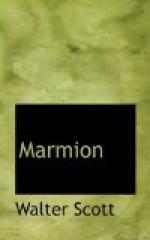’And so hee fell on sleepe; and, halfe waking and halfe sleeping, hee saw come by him two palfreys, both faire and white, the which beare a litter, therein lying a sicke knight. And when he was nigh the crosse, he there abode still. All this Sir Launcelot saw and beheld, for hee slept not verily, and hee heard him say, “O sweete Lord, when shall this sorrow leave me, and when shall the holy vessell come by me, where through I shall be blessed, for I have endured thus long for little trespasse!” And thus a great while complained the knight, and allwaies Sir Launcelot heard it. With that Sir Launcelot saw the candlesticke, with the fire tapers, come before the crosse; but he could see no body that brought it. Also there came a table of silver, and the holy vessel of the Sancgreall, the which Sir Launcelot had seen before that time in King Petchour’s house. And therewithall the sicke knight set him upright, and held up both his hands, and said, “Faire sweete Lord, which is here within the holy vessell, take heed to mee, that I may bee hole of this great malady!” And therewith upon his hands, and upon his knees, he went so nigh, that he touched the holy vessell, and kissed it: And anon he was hole, and then he said, “Lord God, I thank thee, for I am healed of this malady.” Soo when the holy vessell had been there a great while, it went into the chappell againe, with the candlesticke and the light, so that Sir Launcelot wist not where it became, for he was overtaken with sinne, that he had no power to arise against the holy vessell, wherefore afterward many men said of him shame. But he tooke repentance afterward. Then the sicke knight dressed him upright, and kissed the crosse. Then anon his squire brought him his armes, and asked his lord how he did. “Certainly,” said hee, I thanke God right heartily, for through the holy vessell I am healed: But I have right great mervaile of this sleeping knight, which hath had neither grace nor power to awake during the time that this holy vessell hath beene here present.”—“I dare it right well say,” said the squire, “that this same knight is defouled with some manner of deadly sinne, whereof he has never confessed.”— “By my faith,” said the knight, “whatsoeer he be, he is unhappie; for, as I deeme, hee is of the fellowship of the Round Table, the which is entered into the quest of the Sancgreall.”—“Sir,” said the squire, “here I have brought you all your armes, save your helme and your sword; and, therefore, by mine assent, now may ye take this knight’s helme and his sword;’ and so he did. And when he was cleane armed, he took Sir Launcelot’s horse, for he was better than his owne, and so they departed from the crosse.
’Then anon Sir Launcelot awaked, and set himselfe upright, and he thought him what hee had there seene, and whether it were dreames or not; right so he heard a voice that said, “Sir Launcelot, more hardy than is the stone, and more bitter than is the wood, and more naked and bare than is the liefe of the fig-tree, therefore go thou from hence, and withdraw thee from this holy place;” and when Sir Launcelot heard this, he was passing heavy, and wist not what to doe. And so he departed sore weeping, and cursed the time that he was borne; for then he deemed never to have had more worship; for the words went unto his heart, till that he knew wherefore that hee was so called.’—Scott.




